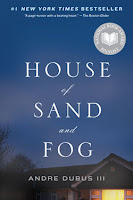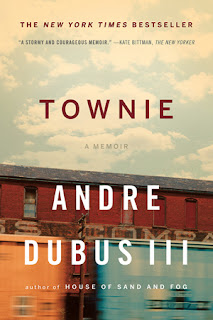
On Wednesday October 24th, Andre Dubus III held a discussion at O'Leary 222 on South Campus at the University of Massachusetts Lowell. Andre Dubus III is an accomplished local writer who grew up in the city of Haverhill not too far from my hometown of Methuen. His essays and novels have earned him several national awards. For instance his novel "House of Sand and Fog" was a finalist for the National Book Award, selected to be in Oprah's Book Club, and was a New York Times #1 bestseller. Some of his works were also featured in "The Best American Essays of 1994". Dubus was also awarded a Guggenheim Fellowship which is awarded to those "who have demonstrated exceptional capacity for productive scholarship or exceptional creative ability in the arts." Each year the foundation receives between 3,500 and 4,000 applications but only accepts around 200. Andre Dubus III is now a full time faculty member at the University of Massachusetts Lowell, and just recently in 2011 has written a memoir called "Townie."

The discussion Andre Dubus III was holding at O'Leary 222 was about his recently written memoir "Townie." Heading into the auditorium I was hoping that this wouldn't take long to be over. To my surprise the longer I was there listening to him, the longer I wanted to stay there and listen to him. He was much different in person than I thought he would be, especially since he didn't act like your average university professor. He spoke to us students, and also other professors who attended, the same as he would to anyone he's known for a while. I suppose that this could be because we already know his life story from reading the "Townie", and that made him feel comfortable being honest towards us.
Once he began speaking I quickly realized that the discussion he planned on having wasn't just about his book, but about life. It was a discussion to grow and connect with people who grew up in the same area, under the same conditions regardless of age or status. He started by reading a passage from the book and talking about it for a brief moment. Ironically, immediately after talking about his book, he explained how much he hates book tours and can very easily grow tired of hearing himself speak and try to be a salesman.This is when I became engaged in everything he was talking about.
One thing that Andre Dubus taught me was that even though he is an established award winning writer and a university professor, that doesn't necessarily mean that he is successful. He told us that success isn't what many of us think it is. It is not about doing something just for the money, and doing things you know you will get recognized for. Being successful is about doing something that your good at that makes you happy. He said "some people who make a lot of money try to tell themselves they're happy because they walk around with a bigger paycheck than everyone else, when really they wish they could be doing something else." He then followed that by saying "if you don't do what you love you will be dead before your dead", and that message really stuck to me. I thought about that with my own major and realized that I made the right choice. I'm happy with what I'm doing for a career path.
Dubus made us know that writing was the correct choice for him. He told us that writing a novel is like planting a seed; you start it but you don't know whats going to come out of it. Dubus claims that when he began writing this book he had no intention of including any of his family members in it, until he took it to a publisher where they asked. Surprisingly the whole book ended up being about his family, and to my surprise again he said that writing about his family was the hardest part.
Andre Dubus talked about how this book almost had not come into existence because he didn't want it to affect anybody in his family's lives. He asked the question to himself "am I trying to hurt anybody by writing this" and the only way he'd write it is if he answered no to that question. He was scared to approach each member of his family about the book after word had gotten out and was shocked by the reactions he got from his brother, sisters, and mother. Writing about his brother's suicidal thoughts and attempts he thought that his brother would never speak to him again. Very humorously he said his brother only asked that it be put in the end of the book that he's not a screw up anymore. His sister on the other hand is proud of Andre for writing but refuses to read it so she wont have to remember. The biggest shock came from his mother. He said when he approached his mother about it he was driving her in his truck, and his stomach was tied in knots. Then suddenly she grabbed his wrist and said "dont you dare not write this story because of me", and followed by saying "I'm too old to give a crap anyway." Andre was telling us this because he wanted to share a big moment in his life so that we'd feel more comfortable talking about ours.
The part of Andre's discussion that grabbed my attention most was when he said "I'm surprised my father even got into the book", when the majority of what he wrote about was his father and how he was never there for him. Andre explained how if his father wasn't dead he would have never written this book. While writing it he remembered how much his dad meant to him after all of the hurt and misery he had put him through. He told us that "memory is obstructed to what's important to us" and what was the most important to him was his father. That's why the book became sort of like a father-son story, where almost the entire book was a conversation he never had with his father. Again he claimed that he wouldn't have written the book if he thought it would hurt one of his family members, and that by writing it he didn't want to damage his father's works and relationships.
For the majority of the discussion students were allowed to ask Andre questions, and I picked up on that when answering them Andre usually referenced to his father without knowing. He told us how writing was his way of life because that's what connected him with his father and what he always loved to do."Art is a way of transferring feeling from the writer to the reading" is a quote that Dubus kept emphasized when talking about his memoir.
Sadly I had to leave this discussion a few minutes early for one of my night classes on North Campus. The last thing I heard Andre Dubus say was "Do the best you can do, not the best you know how to do." What he meant by saying this is that do the best you can do, don't just do what you know you can do. Go beyond what you think your limits are, and surprise yourself just like he did with his memoir "Townie". I really got a lot out of hearing Andre Dubus III speak, and it was interesting hearing a college professor/author approach his audience the way he did. I'm definitely going to the next talk Dubus has on campus.























